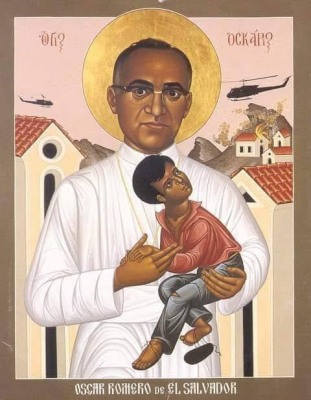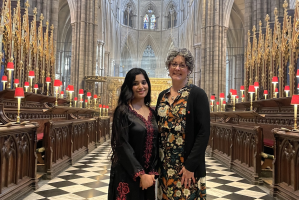Remembering Oscar Romero

Yesterday, a friend for whom canonization is a foreign concept, asked me what Oscar Romero's is about. A number of people reached out to say they enjoyed my response. This is a fragment of that response:
It's about celebrating the life, love, courage, and martyrdom of one of the most Christ-like people who have ever lived.
I lived and worked in El Salvador for about 10 years, and I'd go to the poorest, most war-torn, marginalized, forgotten communities, like a village in rural Morazán where a little old lady told me about the time national guardsmen with M16s came and, ostensibly searching for guerrilla insurgents, rounded up the girls at church choir practice and raped them (this kind of thing, btw, is incredibly common in war, everywhere in the world; and in this case, our government armed BOTH sides of this civil war).
These impoverished subsistence farmers knew they'd have a direct line to the Archbishop, because that's the kind of guy he was, and indeed Archbishop Romero dropped everything, went straight out there to console them, celebrated Mass with them, and announced the truth about what happened on the radio the next day, knowing that being a voice for the voiceless like this would eventually cost him his life.
In these rural communities, the sacrament of communion would be a big community-wide meal at the end of worship (as it was in the early Church, btw). In this case they had prepared a special place for their guest of honor, and Romero said, "give that plate to someone who doesn't normally feel included," and he tore a leaf off a banana tree to use as a plate, and got in line for food with everyone else.
Sometimes Romero would address his killers from the pulpit in the capital, telling them they have already been forgiven, and that the murder will be in vain--they can kill the Archbishop, and all the clergy, but as long as there is a baptized one, the Church, which is the people, will remain. Of his own death, he said, "I don't believe in death without resurrection--if you kill me, I will rise again in the Salvadoran people."
He lived in a small quarters at a cancer hospital called Divina Providencia so that when he was home he could minister to people who were dying of cancer and couldn't afford expensive care. He was assassinated while celebrating Mass at that hospital's chapel, while preparing the elements of communion. The gospel reading assigned by the church that day was from John, "unless a kernel of wheat falls to the ground and dies, it remains only a single seed. But if it dies, it produces many seeds."
So....this is about remembering him, and celebrating the values of the Kingdom of God, and the self-sacrificial love Jesus demonstrated to us on the cross, and Óscar Romero demonstrated in war-torn El Salvador.
Paul Thomas Darilek is a writer and poet who lives now in San Antonio, Texas. For more information see: www.butterfliesbook.com.


















